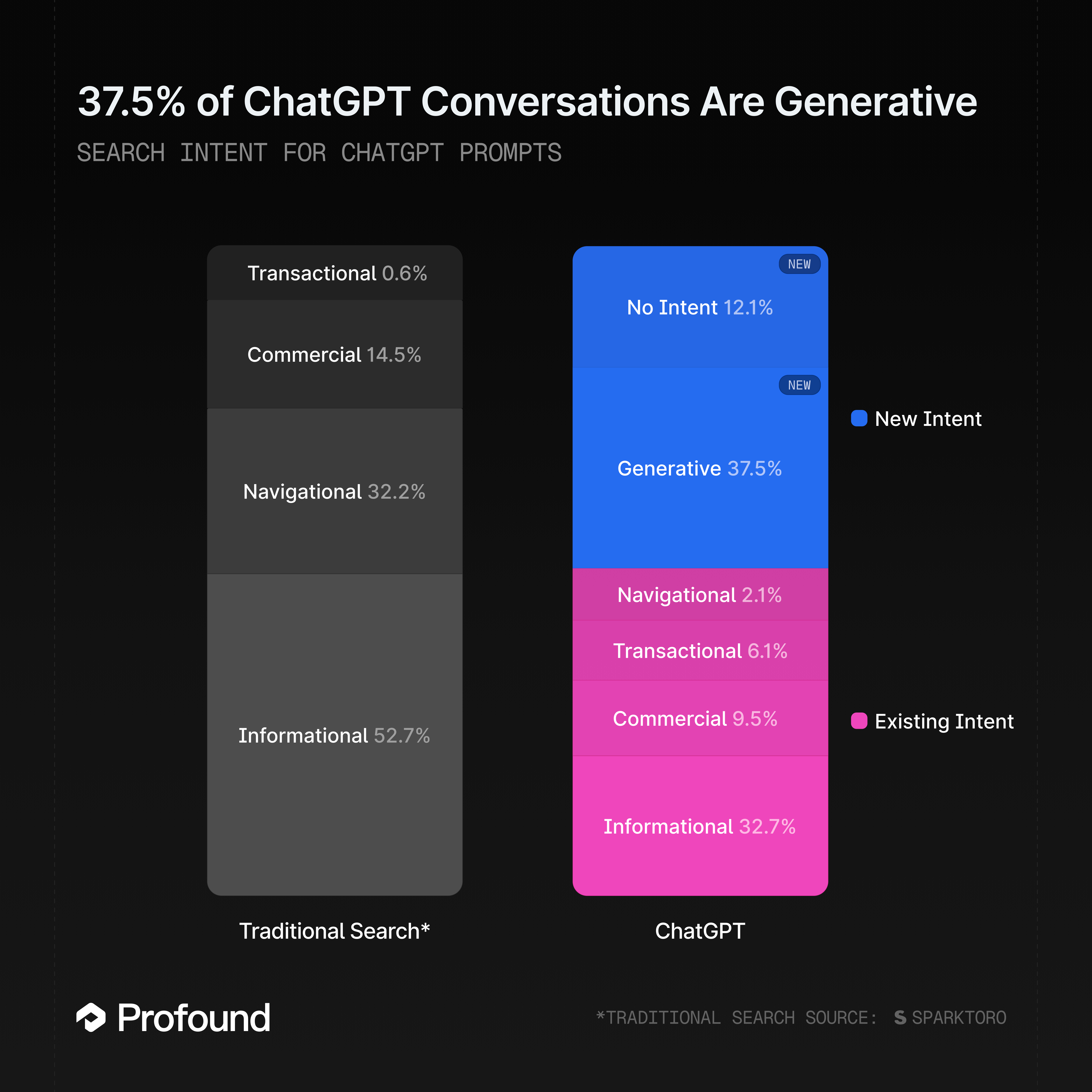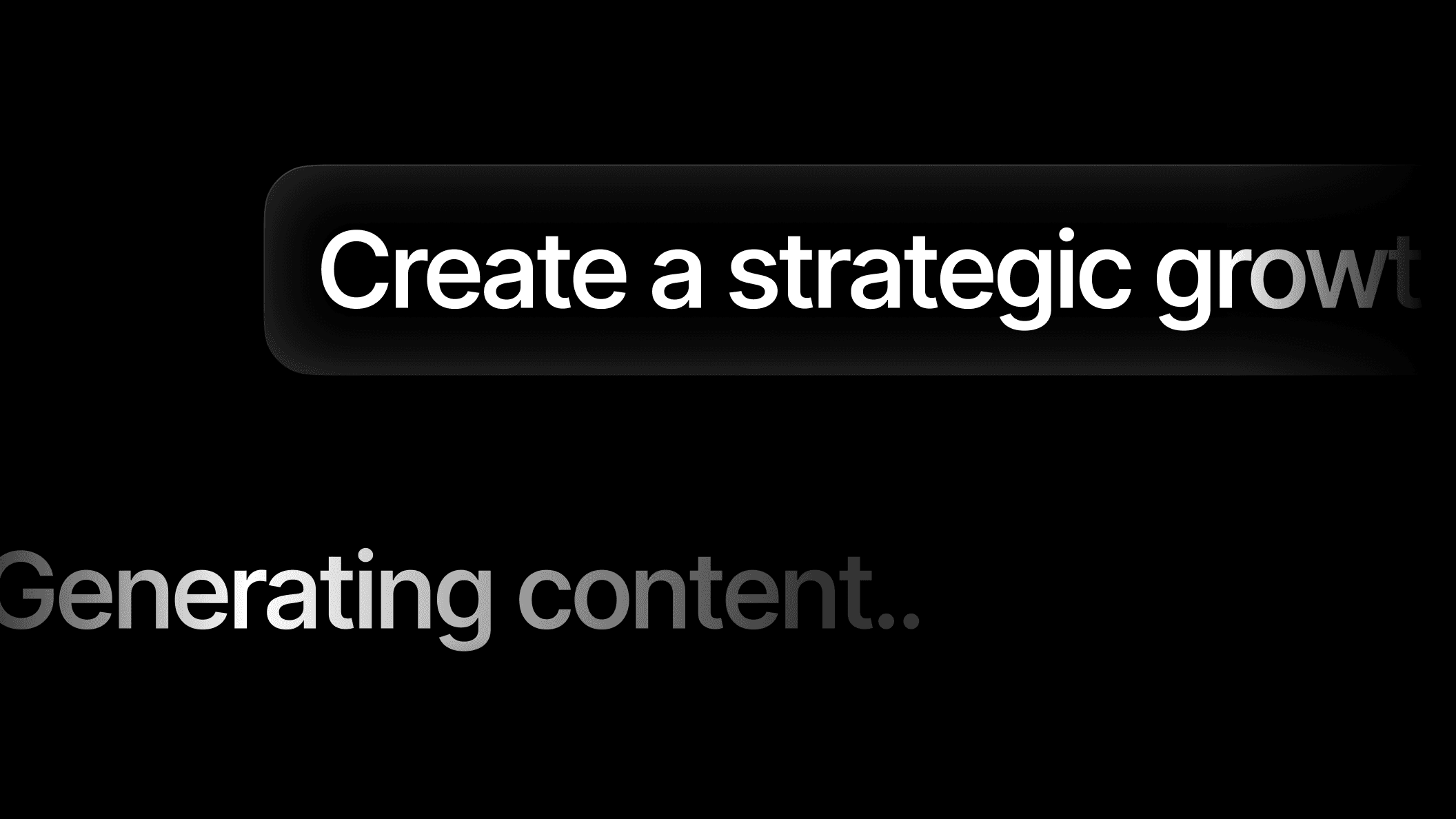AI Search Intent Study: What 50M+ ChatGPT Prompts Reveal
Search has dominated the marketing landscape for decades because it connected users with solutions through clickable journeys. You searched Google, clicked a link, and landed on a website. Then, businesses took over. Traffic created funnels. Funnels drove conversions.
But here's the problem: that whole model breaks the moment the user no longer needs to find something to take action.
Here at Profound, we recently rolled out Prompt Volumes, giving the world access to tens of millions of real ChatGPT user interactions. This isn’t survey data, self-reported information, third-party impressions, or AI-generated predictions. These are real conversations from real users. We extracted and classified a sample of these chats and what we found surprised us, proving one stunning shift that's redefining the entire information economy:

Traditional Search Intent: Transactional: 0.6% Commercial: 14.5% Navigational: 32.2% Informational: 52.7%
ChatGPT Search Intent: No Intent: 12.1% Generative: 37.5% Navigational: 2.1% Transactional: 6.1% Commercial: 9.5% Informational: 32.7%
The number-one AI search intent is generative at 37.5%
When users interact with AI chat models like ChatGPT, they're skipping discovery and navigation entirely. Right now, 37% of all ChatGPT interactions are generative intent meaning that they ask directly for concrete output, “create X” “draft Y” “do Z”.
That figure fundamentally contradicts traditional search, where informational intent (finding answers) dominated by a huge margin at 52%.
But informational intent among ChatGPT prompts has plummeted down to just 32%. This massive 20-point drop upends decades of SEO dogma and means users aren't coming online just to get informed. Instead, they're turning to AI to get things done immediately.
Navigational intent collapsed while transactional intent jumped 9x
At the same time, navigational intent collapsed from 32% to 2%. When you’re in ChatGPT, you don’t need to navigate to another tool. Users aren't using AI to get somewhere — they're using it to get something done.
Transactional intent jumped 9x from 0.6% to 6.1%. People are asking ChatGPT to help them buy running shoes, find deals on software, and procure consulting services, all in the chat (see ChatGPT shopping).
‘No Intent’ Searches account for 12%
That "No Intent" category (12% of all prompts) represents something unprecedented. These are the conversational moments: "please," "thanks," "actually, make it funnier." They're the connective tissue of every AI interaction.
When someone thanks ChatGPT for recommending your product, does that sentiment weigh future recommendations? When they ask for "something more affordable" after your brand gets suggested, how does that reshape the model's understanding of your positioning?
We have no framework for this yet.
SEO’s existential pivot moment is here
These generative requests can't be won by leveraging traditional SEO techniques focused on clicks and ranks. AI-chat prompts completely bypass the on-page landing experiences and the intricate funnels marketers optimize so carefully. Millions of impactful micro-transactions now occur out of sight, invisibly, and are entirely mediated through generative chat experiences. This means our entire landscape of KPIs and attribution models desperately need rewriting.
To put it bluntly, the established metrics will collapse because the traffic (or intent) isn’t gone. It’s moved elsewhere, to a place that’s harder to track: AI search.
Why this matters right now for your business
- When someone asks "create a marketing budget breakdown for a SaaS startup," and ChatGPT delivers a detailed analysis recommending HubSpot, Segment, and Mixpanel without generating a single click... how do any of those companies measure influence? Our attribution models assume traffic flowing from SERP to site to conversion. When the AI researches, compares, evaluates, and recommends entirely within the chat interface, traditional measurement breaks completely.
- Winning now means becoming AI-referenced first and referenced best, not being in the SERP. To influence highly impactful buying conversations, you need optimized content sources targeted to earn AI citations because the future of digital discovery is about being recommended as the solution to an immediate user question.
- Companies stuck operating a traditional funnel reliant on search are betting big against the reality of user behavior. Every week's delay gives faster, more agile competitors a longer runway to establish a foothold through citations and AI responses.
Search Has Become the Experience
This study, based on real conversations directly analyzed from a sample of tens of millions of genuine prompts, is the direct evidence every marketer and digital strategist has been waiting for. It proves that search is now the experience. Users want outcomes delivered directly, and AI obliges without sending traffic anywhere.
Most companies are still optimizing for discoverability when they should be optimizing for recommendability, still chasing rankings when they should be chasing citations, and still measuring clicks when they should be measuring influence.
The data doesn't lie: 37.5% of search behavior has fundamentally shifted to generative intent, and that percentage grows every month. The window to adapt is closing faster than most people realize.
Get Started
Prompt Volumes is available for existing Profound customers. If you’re interested in setting up Prompt Volumes for your brand, please reach out — we’d love to help you get started with Profound.
If you're an existing Profound enterprise customer, you can get started with Prompt Volumes by reaching out to your engagement manager.
